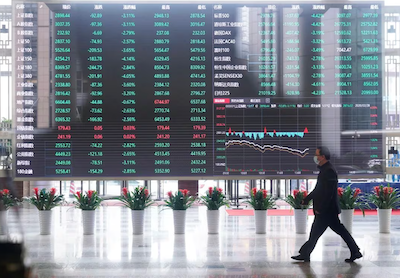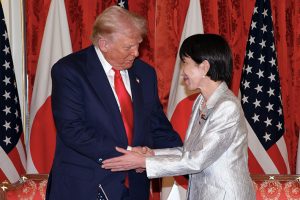Asian stocks went into reverse on Wednesday, with investors unnerved over mixed signals on US interest rates and contradictory data coming out of the world’s biggest economy.
The dollar climbed despite lower US Treasury yields as markets bet on the path the US Fed will take, while the yen sank even with the threat of currency intervention from Japanese authorities.
Tokyo’s Nikkei share average fell more than 1%, slipping from multi-week highs hit in the previous session as earnings releases saw some big name winners and losers.
Also on AF: US Scraps Chipmakers’ Export Licences to Sell to China’s Huawei
The Nikkei share average fell 1.63%, or 632.73 points, to close at 38,202.37, to wipe out Tuesday’s gains, while the broader Topix was down 1.45%, or 39.79 points, to 2,706.43.
Shares of Nintendo lined 5.4% after the gaming company said it plans to make an announcement about the successor to its Switch console, while Mitsubishi Heavy Industries slumped 7.3%.
Automaker Toyota Motor pared losses, declining 0.6%, after posting a record-breaking quarterly operating profit.
The benchmark index had rallied to a three-week high on Tuesday as a downside surprise in US job growth reassured markets that rate cuts may still be on the Federal Reserve’s cards this year.
However, US stock markets meandered overnight due to a lack of new clues to confirm the timing and size of potential cuts, giving Japan’s Nikkei little momentum to go on.
A drag in US technology shares on Tuesday also generated some headwinds for Japanese shares.
China and Hong Kong stocks dropped, led by a decline in the property sector as market sentiment appeared to cool down from a strong rally.
The weakness also follows a Federal Reserve official’s comments that the US central bank may hold rates steady all year to fight inflation, putting outflow pressure on broad Asian stocks.
The CSI real estate index lost 3% by midday, giving up the gains from the previous session.
China’s blue-chip CSI300 index was down 0.79% with, earlier in the session, its financial sector sub-index lower by 0.39%, the consumer staples sector down 0.48% and the healthcare sub-index down 1.44%.
US Dollar Index Gains
The Shanghai Composite Index slipped 0.61%, or 19.26 points, to 3,128.48, while the Shenzhen Composite Index on China’s second exchange dropped 1.33%, or 23.95 points, to 1,772.82.
Chinese H-shares – stocks belonging to companies from the Chinese mainland – listed in Hong Kong fell 0.42% to 6,499.39, while the Hang Seng Index lost 0.90%, or 165.51 points, to 18,313.86.
Elsewhere across the region, in earlier trade, Singapore, Wellington, Bangkok and Jakarta also retreated. Sydney, Seoul, Taipei and Manila edged up, while Mumbai was unmoved. MSCI’s broadest index of Asia-Pacific shares outside Japan slid 0.4%.
US stock futures were flat, while German DAX futures lost 0.1% and Britain’s FTSE futures added 0.15%.
The yen dropped 0.34% to 155.215 per dollar, even as Japan’s Finance Minister Shunichi Suzuki expressed deep concern over the negative impact of a weak currency and reiterated a readiness to respond to excessive volatility.
The US dollar index, which measures the currency against the yen, euro, sterling and three other major peers, rose 0.14% to 105.57, adding to Tuesday’s 0.3% advance.
On Tuesday, Minneapolis Fed President Neel Kashkari suggested the US central bank may need to forgo interest rate cuts this year due to stubborn inflation.
But last week, Fed Chair Jerome Powell said the wait to loosen policy is taking longer than anticipated, but signalled his inclination is still to cut.
US long-term Treasury yields stood at 4.47% in Asian trading, after dipping to a nearly one-month low of 4.42% on Tuesday.
Key figures
Tokyo – Nikkei 225 < DOWN 1.63% at 38,202.37 (close)
Hong Kong – Hang Seng Index < DOWN 0.90% at 18,313.86 (close)
Shanghai – Composite < DOWN 0.61% at 3,128.48 (close)
London – FTSE 100 > UP 0.37% at 8,344.22 (0934 BST)
New York – Dow > UP 0.08% at 38,884.26 (Tuesday close)
- Reuters with additional editing by Sean O’Meara
Read more:
Asian Markets Lose $2.5 Billion as Outflows Continue in April
China Home Sales Plunge by Half During May Day Holiday
China Services Sector Eases in April But New Orders Grow: Caixin
Nikkei Leads Asian Stocks Higher, But Hang Seng Dips; FX Down
























